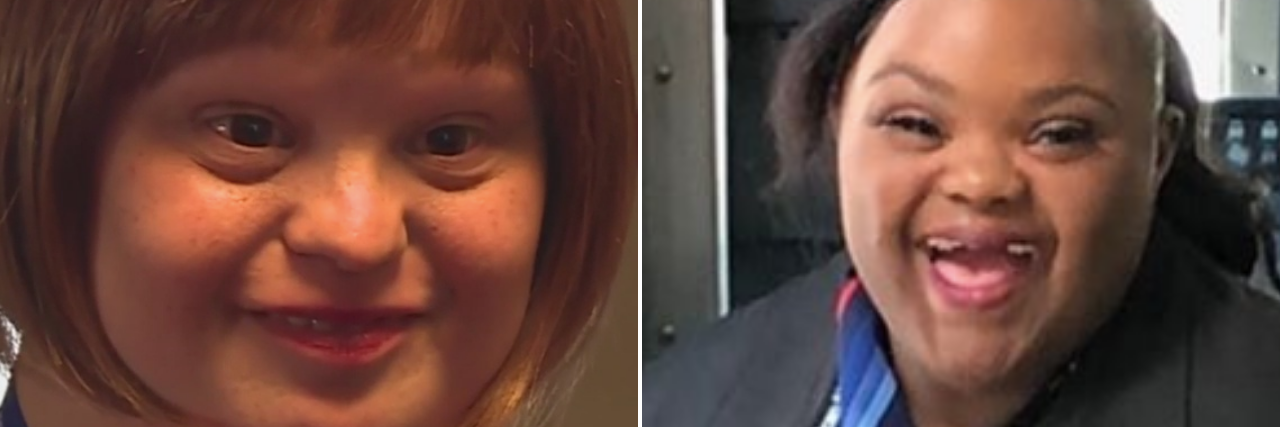Women With Down Syndrome Made Honorary Flight Attendants
Sometimes the news isn’t as straightforward as it’s made to seem. Ellen Stumbo, The Mighty’s Parenting Editor, explains what to keep in mind if you see this topic or similar stories in your newsfeed. This is The Mighty Takeaway.
Tracy Sharp, a woman with Down syndrome, wanted to be a flight attendant. In August, her dream came true when Southwest Airlines allowed her to be a flight attendant on a trip to Sacramento. Her parents accompanied her on the flight.
Tracy Sharp lives with Down syndrome. She always wanted to be a flight attendant, and on Friday she became one for Southwest Airlines on her dream flight. #kudos #swa https://t.co/w2qf4cjI1z
— DSG of Greater KC (@DSGKC) September 3, 2018
Then, in October, American Airlines “inducted” 17-year-old Shantell “Princess” Pooser, who has Down syndrome and a terminal illness, to be its first flight attendant with disabilities. The event was her birthday celebration, and the plane full of family and friends waiting to celebrate her. Pooser helped the other flight attendants as they taxied the runway.
Both women’s stories have been shared and touted as “inspirational.” As the mother of a child with Down syndrome and The Mighty’s parenting editor, I know how common it is to see stories about people with disabilities made to sound “inspirational.” Sure, it is a nice gesture, but the voices of the women with Down syndrome are missing. I want to hear from Sharp, I want to know what this experience was like for her. Instead, news stories focused on interviewing the flight attendant who helped her and some omitted Sharp’s last name. I want to hear from Pooser — she seems to be outgoing and sassy. Why not interview her?
Interviewing and focusing on the person the story is about should be the norm when reporting. So often these stories focus on the “niceness” of others and exclude the voices of disabled people. The term “inspiration porn” comes to mind. Inspiration porn refers to “objectifying” people with disabilities and using them as “inspiration.” There is a way to tell these stories right, but in order to do that, we need to focus on the voices of the people with disabilities whose stories we share.
What Southwest Airlines and American Airlines have done right is to allow someone with a disability to experience the work necessary to perform the job. While I love seeing Sharp and Pooser have the opportunity to experience what it is like to be a flight attendant, ultimately, what people with disabilities need are jobs that will pay their bills.
It is common to “shadow” people who have jobs you may be interested in, but few businesses extend these opportunities to people with disabilities. But will Southwest Airlines and American Airlines take the next step and employ flight attendants with disabilities?
According to the Bureau of Labor Statistics, people with disabilities have a significantly higher rate of unemployment. In 2017, only 18.7 percent of people with disabilities were employed.
People with disabilities need jobs. They are capable and ready to work. The question is, what businesses out there will be the ones to go beyond a one-time feel-good moment, and extend the opportunity of employment to people with disabilities?
Wouldn’t it be exciting to see Sharp become a flight attendant? Not in a flight where her parents come along for a ride, but a real job, where she has a schedule and a paycheck? I understand due to Pooser’s health condition, an ongoing job as a flight attendant may not be a possibility. What a great show of community for the staff of American Airlines to throw her a party where she gets to experience her dream of being a flight attendant. But will they now consider hiring someone with a disability?
While I will be thankful if a business is willing to open its doors for my daughter to try out several professions or careers she may be interested in, at the end of the day, my daughter will need a job. A “one-time thing” feels a lot like charity, a way to “boost” a business — something done for PR purposes. An offer of employment acknowledges people with disabilities have gifts and talents they bring to the workforce. We need to employ people with disabilities not for a “feel good” moment, but to provide more people with livelihoods.
In my town, there is a man who owns three Culver’s fast-food restaurants. Every time I go, I see at least one person with a disability working there. The owner has even taken the time to come and talk to our family, and has gone as far as telling my daughter to come see him when she turns 14, the age she can begin working. He is not doing this to be in the spotlight, I suspect it is simply a smart business move on his part as he is aware his employees with disabilities are hard workers, strive in routine tasks and are friendly to guests.
It is time for other businesses to consider employing people with disabilities. Jobs matter.
Banner image via Instagram and screenshot from CBS news coverage.

